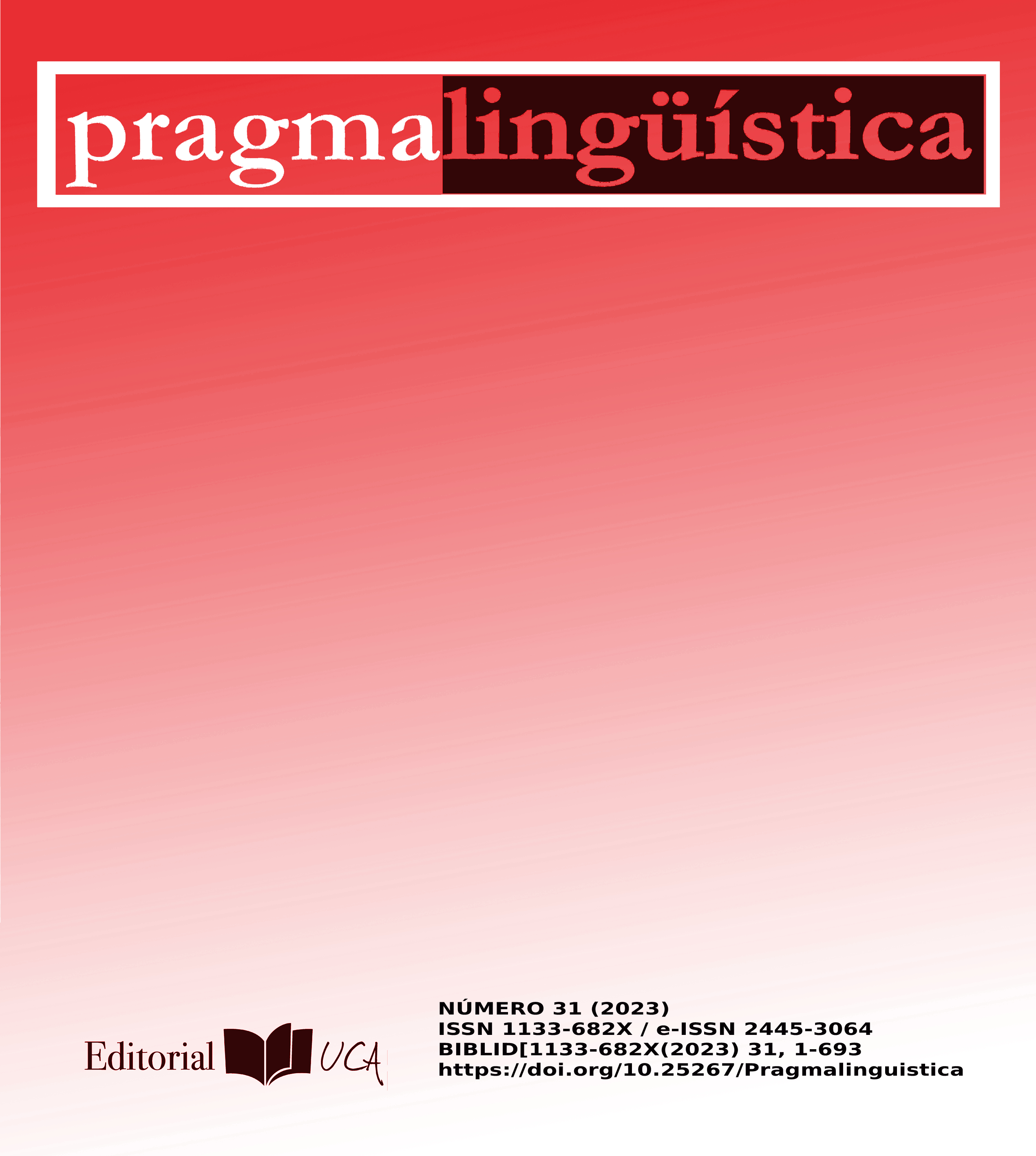How to justify a war: critical discourse analysis of the speeches given by Vladimir Putin, Barack Obama and Donald Trump

DOI
https://doi.org/10.25267/Pragmalinguistica.2023.i31.11Info
Abstract
In this paper we analyse, within the framework of Pragmatics and Critical Discourse Analysis, Vladimir Putin’s speech on February 24, 2022, where he announced the war between Russia and Ukraine, euphemistically called “special military operation”. His declaration of war will be compared with those made by Barack Obama and Donald Trump at the start of the military conflict of the United States against Libya and Syria, respectively. According to our hypothesis, the principles of “just” wars (Just War Theory) will be present in the three speeches, in order to legitimise their decision before the audience, and convince them of its inevitability. To identify this, the qualitative analysis of each corpus is complemented with data provided by Sketch Engine. The results show similarities among the three speeches, with only some minor differences regarding the reason for the attack and the threat they pose to their enemy.
Keywords
Downloads
How to Cite
License
Copyright (c) 2023 Alicia Mariscal Ríos

This work is licensed under a Creative Commons Attribution-NonCommercial-NoDerivatives 4.0 International License.
References
ARRIETA-CASTILLO, C. (2022): “Estrategias persuasivas en los eslóganes políticos. Estudio pragmalingüístico de los eslóganes de la democracia española”, Pragmalingüística, 30, pp. 27-46. https://doi.org/10.25267/Pragmalinguistica.2022.i30.02
AUSTIN, J. L. (1962): How to Do Things with Words. Oxford: Clarendon Press.
ÁVILA MUÑOZ, A. M. (2021): “La atenuación discursiva en el contexto de la acomodación comunicativa. Análisis de casos”, Pragmalingüística, 29, pp. 27-43. https://doi.org/10.2526/Pragmalinguistica.2021.i29.02
BELLAMY, A. J. (2006): Just Wars: From Cicero to Iraq, Cambridge: Polity Press.
BOUCHARD, D. (1983): On the Content of Empty Categories, Berlin: De Gruyter Mouton.
CAP, P. (2006): Legitimization in political discourse, Newcastle: Cambridge Scholars.
ESCANDELL-VIDAL, M.ª V., AMENÓS PONS, J. y AHERN, A. K. (eds.) (2020): Pragmática, Madrid: Akal.
FERNÁNDEZ BARGE, X. (2021): Un análisis crítico del uso de falacias y mecanismos de refuerzo y atenuación en el discurso de los líderes políticos españoles en debates televisivos. Tesis Doctoral. Universidad de Cádiz.
FERNÁNDEZ GARCÍA, F. (2017): La descortesía en el debate electoral cara a cara, Sevilla: Universidad de Sevilla.
FERNÁNDEZ GARCÍA, F. y AGUAYO CRUZ, M.ª D. (2019): “Variación cultural y situacional en la gestión del desacuerdo”, Pragmalingüística, 27, pp. 10-31. https://doi.org/10.25267/Pragmalinguistica.2019.i27.01
FESTINGER, L. y CARLSMITH, J. M. (1959): “Cognitive consequences of forced compliance”, The Journal of Abnormal and Social Psychology, 58(2), pp. 203-10.
GILES, H., COUPLAND, N. y COUPLAND, J. (1991): “Accommodation theory: Communication, context, and consequence”, Giles, H., Coupland, J. y Coupland, N. (eds.), Studies in emotion and social interaction. Contexts of accommodation: Developments in applied sociolinguistics, Cambridge: Cambridge University Press, pp. 1-68.
GREEN, M. (2021): “Speech Acts”, Zalta, E. N. (ed.), The Stanford Encyclopedia of Philosophy. Disponible en: https://plato.stanford.edu/archives/fall2021/entries/speech-acts/ (Fecha de consulta: 03/02/2023).
GRICE, P. (1989): Studies in the Way of Words, Cambridge, Massachusetts: Harvard University Press.
HERMAN, E. S. (1992): Beyond hypocrisy: decoding the news in an age of propaganda: A doublespeak dictionary for the 1990s, Boston: South End Press.
JARY, M. (2020): “Los actos de habla”, Escandell-Vidal, M.ª V., Amenós Pons, J. y Ahern, A. K. (eds.), Pragmática, Madrid: Akal, pp. 60-78.
MARISCAL RÍOS, A. (2020): “El miedo como estrategia de persuasión y disuasión durante la crisis sanitaria originada por la COVID-19”, Gil, M., Godoy, F. J. y Padilla, G. (eds.), Comunicando en el siglo XXI: nuevas fórmulas, Valencia: Tirant lo Blanch, pp. 289-301.
MARISCAL RÍOS, A. (2022a): “El poder del lenguaje en la comunicación política en tiempos de COVID: análisis contrastivo multilingüe de los discursos de Pedro Sánchez, Boris Johnson, Giuseppe Conte y António Costa en los inicios de la pandemia”, Altre Modernità, 28, pp. 37-53. https://doi.org/10.54103/2035-7680/19111
MARISCAL RÍOS, A. (2022b): “La imperiosa necesidad de construir ‘muros’ para protegernos de los ‘invasores’: análisis contrastivo del discurso antiinmigratorio de Donald Trump y Santiago Abascal en Twitter”, Lengua y Migración, 14(2), pp. 83-105. https://doi.org/10.37536/LYM.14.2.2022.1754
MARISCAL RÍOS, A. (2023): “El lenguaje como arma de legitimación política de los conflictos bélicos: análisis contrastivo de los discursos de Bush, Blair y Aznar para comunicar la guerra de Irak”, de Santiago-Guervós, J., Fernández Ulloa, T. y Soler Gallo, M. (eds.), El discurso como herramienta de control social, Berlín: Peter Lang, pp. 245-255.
McCRISKEN, T. (2012): “Justifying sacrifice: Barack Obama and the selling and ending of the war in Afghanistan”, International Affairs, 88(5), pp. 993-1007.
MOSELEY, A. (2004): “Just War Theory”, Fieser, J. y Dowden, B. (eds.), Internet Encyclopedia of Philosophy. Disponible en: https://iep.utm.edu/justwar/ (Fecha de consulta: 03/02/2023).
MUSOLFF, A. (2016): Political metaphor analysis discourse and scenarios, London: Bloomsbury Academic.
ORWELL, G. (1946): “Politics and the English Language”, Horizon, 13(76), pp. 252-265.
ORWELL, G. (1949): Nineteen eighty-four (1984), London: Secker & Warburg.
PILGER, J. (1993): “When war is peace, and vice versa”, New Statesman & Society, 126. Dis-ponible en: https://www.greenleft.org.au/content/when-war-peace-and-vice-versa (Fe-cha de consulta: 03/02/2023).
PILGER, J. (2008): “America’s great game: John Pilger on how Washington has orchestrated war in Afghanistan”. Disponible en: https://www.newstatesman.com/long-reads/2008/01/pilger-taliban-afghanistan (Fecha de consulta: 03/02/2023).
RAWLS, J. (1971): A Theory of Justice, Cambridge: Harvard University Press.
SARTORI, G. (2007): ¿Qué es la democracia? Madrid: Taurus Pensamiento.
SEARLE, J. R. (1975): “A taxonomy of illocutionary acts”, Gunderson, K. (ed.), Language, Mind and Knowledge, Minnesota Studies in the Philosophy of Science, Minneapolis: University of Minnesota, pp. 344-369.
SEARLE, J. R. y VANDERVEKEN, D. (1985): Foundations of Illocutionary Logic, Cambridge: Cambridge University Press.
VAN DIJK, T. A. (2006): “Discurso y manipulación: discusión teórica y algunas aplicaciones”, Signos, 39(60), pp. 49-74. http://dx.doi.org/10.4067/S0718-09342006000100003
WALZER, M. (1977): Just and Unjust Wars: A Moral Argument with Historical Illustrations, New York: Basic Books.
WODAK, R. (2021): The Politics of Fear: The Shameless Normalization of Far-Right Discourse, London: SAGE.






